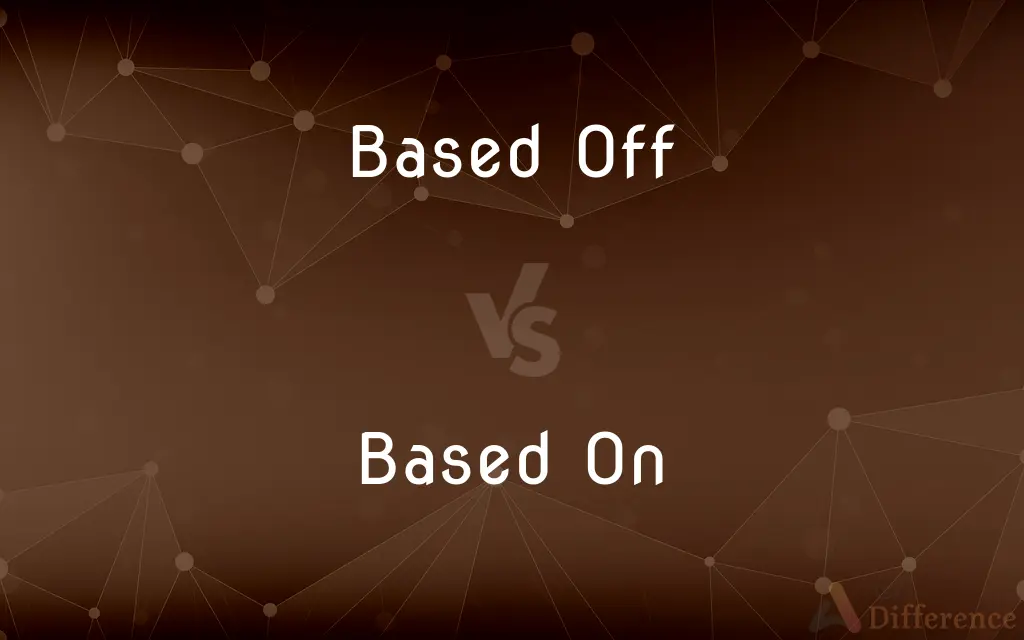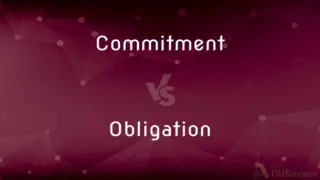Based Off vs. Based On — What's the Difference?
Edited by Tayyaba Rehman — By Fiza Rafique — Published on January 13, 2024
"Based on" refers to something derived from a source, while "based off" is a less formal variant with a similar meaning, often implying a looser connection.

Difference Between Based Off and Based On
Table of Contents
ADVERTISEMENT
Key Differences
"Based off" is a colloquial phrase that suggests a concept is derived or inspired by another idea but is not necessarily a direct result of that idea. "Based on," however, is the standard phrase used to indicate that something is directly built upon or uses the original idea as a foundation. Both phrases suggest a source of inspiration or foundation, but "based on" is preferred in formal writing.
In literature and art, "based off" might be used casually to describe how one work is inspired by elements of another, hinting at a point of departure more than a foundation. "Based on" is typically used to describe a closer, more direct relationship, suggesting that the new work closely adheres to the source material. "Based on a true story" is a common phrase that exemplifies this close relationship.
Within academic contexts, "based off" can be seen as less precise than "based on." The former might imply a hypothesis generated from an initial observation, while "based on" often introduces the evidence or theory supporting an argument. The preference for "based on" in academic and formal settings underscores its role in establishing clear, direct connections.
In everyday speech, people may use "based off" interchangeably with "based on," though purists would argue for the correctness of "based on." This usage does not typically confuse the meaning but may affect the perceived formality of the statement. Both "based off" and "based on" communicate a relationship, but the clarity and formality of "based on" make it the safer choice for clear communication.
Despite their nuances, "based off" and "based on" are understood in context and both convey the concept of origination or derivation. "Based on" carries a connotation of authority and is more likely to be seen in published works, official documents, and academic research, whereas "based off" may be found in informal discussions and creative explorations of ideas.
ADVERTISEMENT
Comparison Chart
Formality
Less formal, colloquial
More formal and accepted in standard English
Implication
Suggests a looser connection
Implies a direct, foundational connection
Usage in Writing
Less common in formal writing
Preferred in formal and academic writing
Connotation
Implication of derivation or inspiration
Suggests a strong foundation or evidence
Prevalence
More common in casual or spoken language
Universally accepted in both spoken and written English
Compare with Definitions
Based Off
Loosely connected to a source or original.
The play was based off historical events, though many liberties were taken.
Based On
Using something as a clear point of reference.
The film is based on a true story that captivated the nation.
Based Off
Originating from a certain point or reference.
The artist’s work was based off his childhood memories in the countryside.
Based On
Established directly on a foundation or source.
The novel is based on the author's own life experiences.
Based Off
Derived from an idea or concept in a general sense.
The movie was based off a popular comic book series from the 90s.
Based On
Derived from specific information or evidence.
Her conclusions are based on months of research.
Based Off
Informed by a starting point or foundation.
The theory was based off a single observation during her experiments.
Based On
Direct adaptation from a source material.
The series is based on a best-selling book of the same name.
Based Off
Inspired by something without strict adherence.
Her fashion line was based off vintage styles, but with a modern twist.
Based On
Formed by closely following a precedent or original.
The recipe is based on my grandmother’s traditional cooking.
Common Curiosities
What does "based off" imply about the relationship to the source?
"Based off" implies a looser, more indirect relationship to the source.
Does "based on" indicate a close relationship to the original material?
Yes, "based on" indicates a close and direct relationship to the source.
Is "based off" correct to use in writing?
"Based off" is less formal and less common in writing; "based on" is preferred for formal contexts.
Is "based on" suitable for scientific research?
Yes, "based on" is appropriate as it suggests evidence-based conclusions.
Is "based off" commonly used in academic writing?
No, "based on" is the standard in academic writing for clarity and formality.
Can "based on" be used interchangeably with "based off"?
In formal writing, "based on" is preferred. In casual speech, they may be used interchangeably.
Does "based off" have a different meaning than "based on"?
The meaning is similar, but "based off" may suggest a starting point, whereas "based on" implies a foundation.
Does "based off" sound casual?
Yes, "based off" tends to sound more casual and conversational.
Can "based off" be considered incorrect?
While not incorrect, "based off" is less formal and not the preferred choice in formal contexts.
Are there contexts where "based off" is the better choice?
"Based off" may be more suitable in informal discussions or creative contexts.
What is the most universally accepted phrase?
"Based on" is the most universally accepted and understood phrase.
Which phrase is better for legal or official documents?
"Based on" is better for legal or official documents due to its precision.
Will using "based off" affect my credibility?
In formal contexts, it could, as "based on" is the more traditionally correct form.
What would a grammar purist likely use?
A grammar purist would likely use "based on" for its historical usage and precision.
Should I correct someone using "based off" in conversation?
In casual conversation, it’s generally not necessary unless clarity is an issue.
Share Your Discovery

Previous Comparison
DDA Algorithm vs. Bresenham’s Line Drawing Algorithm
Next Comparison
Commitment vs. ObligationAuthor Spotlight
Written by
Fiza RafiqueFiza Rafique is a skilled content writer at AskDifference.com, where she meticulously refines and enhances written pieces. Drawing from her vast editorial expertise, Fiza ensures clarity, accuracy, and precision in every article. Passionate about language, she continually seeks to elevate the quality of content for readers worldwide.
Edited by
Tayyaba RehmanTayyaba Rehman is a distinguished writer, currently serving as a primary contributor to askdifference.com. As a researcher in semantics and etymology, Tayyaba's passion for the complexity of languages and their distinctions has found a perfect home on the platform. Tayyaba delves into the intricacies of language, distinguishing between commonly confused words and phrases, thereby providing clarity for readers worldwide.













































